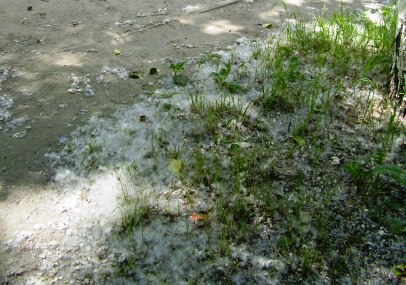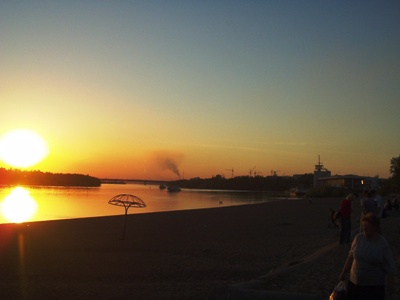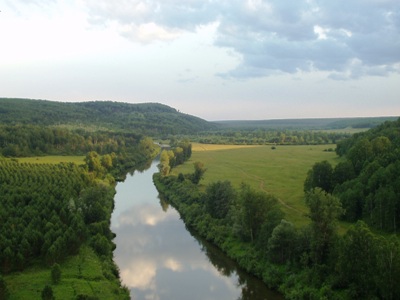«Моё первое русское лето» [My first Russian Summer] Posted by josefina on Jul 6, 2010 in History, Russian for beginners, Russian life, when in Russia
Russia is white not only in winter: during summer she’s («Россия» is after all a feminine noun!) covered in what I like to call «летний снег» [summer snow]. Other people call it simply «белый пух» [white down; fluff; fuzz]. The real name for it is «тополиный пух» [poplar fuzz] – and no Russian summer is complete without it!
Today I was reading through our next guest post by Sam (which will be posted here on the blog on Thursday) and the beginning of it brought me back to every summer I ever spent in Russia, but especially «моё первое русское лето в Омске в 2005 (две тысячи пятом) году» [my first Russian summer in Omsk in 2005]. Even though Yelena and I had already decided that we would not have more than one guest post per month by our readers (really, we have the best, most attentive, interesting and creative readers any blog could ever ask for!), she sent Sam’s post to me together with such thrilled comments from her that I couldn’t but throw myself over it and read it straight away… Anyone who’s ever been to Russia between «в конце июня» [the end of June] and «в начале июля» [the beginning of July] remembers that – strangely enough, despite degrees between 30 and 40 C – the ground was white, covered in something fluffy. And what is worse: before the «белый пух» [white fluff] arrives safely on the ground, it is everywhere in the air around you (for some reason it sticks wonderful to lipstick… but even better on lip-gloss!) and causes many a Russian to spend a large part of their summer vacation sneezing. This is nothing else but the dreaded «тополиный пух» [poplar fuzz] which comes from a tree called «тополь» [sing. poplar] in Russian. Surprisingly many Russian cities today have «тополя» [pl. poplars] as the most common tree in public parks. Before my first Russian summer I was not familiar with this tree at all; I don’t think I had seen it before in my life. «Летний снег» [summer snow] was a new, foreign concept to me. I noticed the ground was covered in this white fluff, that many of my Russian friends in Siberia (where I lived at the time – «ах, сладкая юность!» [oh, sweet youth!]) suffered from terrible allergic reactions and I had to ask: «Почему?» [Why?] They told me it was because this particular tree grows very fast and can become ‘full-grown’ within three, four, five years. I joked: «Находка для пятилетки!» [A find for the five year plan!]. They didn’t find my joke very funny – because it was true.
A photograph from 2005: «лето в Сибири» [summer in Siberia] and a scene from the «река Иртыш на закате» [river Irtysh in sunset].
Many things surprised me during my first summer in Russia. I had arrived in Siberia «в феврале того же 2005 (две тысячи пятого) года» [in February that same year 2005] by train an early morning when it was «минус 35 (тридцать пять)» [minus 35 C]. For two months it was so very cold; probably the coldest winter in my life – at least until the winter of 2009/2010 «на Урале» [in the Urals] – and I could not even picture me how Siberia looked underneath all of the snow. When the snow still hadn’t begun to melt and it was already the middle of March, I started to seriously doubt there would ever be «лето в Сибири» [summer in Siberia]. Then it came – «вдруг!» [suddenly!], as «Фёдор Михайлович» [Fyodor Mikhailovich (Dostoevsky)] would have put it. The snow melted – «хлоп!» [bang!] The heat arrived – «хлоп!» [bang!] The trees bloomed – «хлоп!» [bang!] All of the sudden it was «выше 30 (тридцати) градусов тепла» [more than 30 degrees warm] and it was only the beginning of April… That’s when I realized that «в Сибири не бывает весны» [in Siberia there is no spring] – something that I afterwards tried relentlessly to explain to people living in other places, where the seasons are four. Most of them still can’t seem to fathom that in Siberia there are really only two: «зима и лето» [winter and summer] – «зима ледовая и лето жгучее» [an ice winter and a burning summer]. The weeks between the two are only «переходные стадии» [passing stages]. But the spring heat was only the a preview of what the summer had in stored: the temperature rose to «около 40 (сорока) в июне» [around 40 C in June], and «в середине июля было 45 (сорок пять) градусов» [in the middle of July it was 45 C degrees]. The asphalt felt soft underneath my feet when I walked; and after that I’ve never complained seriously about the Russian roads being so outstandingly poor. After all, when they’re frozen half of the year and almost melting the other half – what do you expect?
My first Russian summer was special in many ways. For example, I had never before been anywhere that warm where there was no air-condition – let alone live for months in such a place! Luckily, my room «в общаге» [in the dorm (colloquial for «общежитие» [dormitory])] in Omsk didn’t have sunshine in the morning (that adventure was waiting for me in the Urals, where I lived for four years in a room with morning sun; why go to the beach when you can get a tan from the comfort of your own bed in Russia?!). The buses turned to saunas and everyone who could tried to hide in old buildings from the 19th century – which had thick enough walls to keep the heat out. But Siberia was not only smelly during the summer of 2005, she (once again, a feminine noun) was also beautiful. Summer wasn’t short – Omsk is after all located in SOUTHERN Siberia – but nature still did the best it could to make the most of it. 2005 was also the last year before it became «запрещено купаться» [forbidden to swim (or bathe)] in the river «Иртыш» [Irtysh], so we still had the opportunity to cool off that way every once in a while. Not that the Russians stopped swimming in the river in the summer of 2006 because it was suddenly forbidden…
But what perplexed me the most during «моё первое русское лето» [my first Russian summer] was something completely else: a sign saying «технический перерыв» [technical break] on the door of a tiny kiosk selling «мороженое» [ice-cream]. What do they mean? I wondered. Do they turn off the freezers during this ‘technical break’? But then the ice-cream will melt? What do they do during this break? What kind of complex technical equipment do they have in there, which is in need of breaks at least twice a day? Russia in the summer seemed increasingly mysterious to me. I didn’t find out the secret behind this sign – and many signs just like it – until one of my co-workers at the Dostoevsky Museum in Omsk had her birthday in August. The museum closed for the entire day, and a sign was placed on the door: «санитарный день» [sanitary day]. Yet nobody left work or cleaned anything – instead everyone stayed and enjoyed lots of food, vodka, cake and even dancing until late in the evening!
Another photograph from the summer of 2005: taken «на Алтае» [in the Altay Mountains], but only in the very ‘beginning’ of them, so don’t let the lack of hills confuse you… It is one of the most beautiful places in Siberia.
I think that during my first Russian summer – though I did many other things, too: I traveled to «Новосибирск» [Novosibirsk], «Красноярск» [Krasnoyarsk] and even went on «поход на Алтае» [a hike in the Altay Mountains] – cemented in me a strong love not only for this country, but for also for the Russian people. Without them, Siberia would only be a huge piece of land, a geological reality, so to speak. But with the Russians inhabiting it, this land is legendary to many – in history, culture as well as modern mythology – it’s a little bit absurd and absolutely lovely. If anyone asked me to go live the rest of my life in Siberia, I wouldn’t hesitate. I’d just go. Even if I wasn’t offered to live in «Иркутск» [Irkutsk], but had to settled for some tiny town like «Тара» [Tara] instead. That’s how romantic a person I am…
Where in Russia would you go to live the rest of your life without hesitating? Or am I mad for even asking?

Build vocabulary, practice pronunciation, and more with Transparent Language Online. Available anytime, anywhere, on any device.







Comments:
saint:
I think those “reasons” for not working came during the Soviet time, as you can find them all across the post-Soviet world.
Natalie:
Josefina, are you still in Russia or have you left?
Alfredo:
Thanks a lot Josefina. Useful information. Absolutely.
josefina:
@Natalie: It makes me very sad to say that I am no longer in Russia – I left ten days ago 🙁 and I will most likely be back in the country only next year… but Russia will live in my heart, mind and soul! Без России никуда, и – русские всегда рядом!